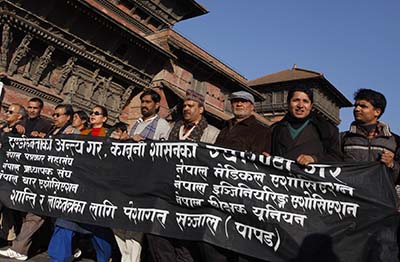New York, September 18, 2013–The Committee to Protect Journalists welcomes Monday’s arrest of an individual suspected to have ordered the 2009 murder of journalist Uma Singh, and calls on authorities to ensure the case is brought to justice.
Police said today that they had arrested Umesh Yadav in Kailali district, approximately 400 miles outside the capital, Kathmandu, according to local news reports. Yadav, a former Maoist, is suspected of ordering the murder of Singh, the 27-year-old print and radio reporter, Shiva Gaunle, chairman of the Federation of Nepali Journalists, told CPJ.
Singh, a reporter for Janakpur Today and Radio Janakpur, was killed when about 15 assailants wielding knives attacked her in her home in Janakpur.
Local journalists have long maintained that the original police investigation had ignored her profession as a possible motive. The Federation of Nepali Journalists said that Singh’s murder was related to her work as a journalist because she had been very critical of the Maoists in her region, who she believed had abducted her father and brother in 2005. Singh’s work in print and on air had also addressed sensitive issues including communal violence and women’s rights, according to an investigative report compiled by press freedom groups.
Following Singh’s murder, police arrested the journalist’s sister-in-law, Lalita Devi Singh, accusing her of involvement in the case, and claimed that Singh had been killed over a property dispute within the family. Police also arrested Nemlal Paswan, a local Maoist leader. The connection between Lalita Singh and Paswan is unclear. Both were given life terms in June 2011.
“CPJ welcomes the arrest of a suspected mastermind in Uma Singh’s murder case as a significant first step,” said Bob Dietz, CPJ’s Asia program coordinator. “However, only a robust effort by authorities to prosecute and deliver a just verdict will help to reverse deep-rooted impunity for journalist murders in Nepal.”
Weak law enforcement and a culture of political protection have created a climate of impunity in Nepal, where five journalist murders remain unsolved. For the first time since 2008, the country dropped off CPJ’s Impunity Index, which spotlights countries where journalists are slain and killers go free. Yet progress in addressing impunity for journalist murders remains tempered.
- For more data and analysis, visit CPJ’s Nepal page here.
